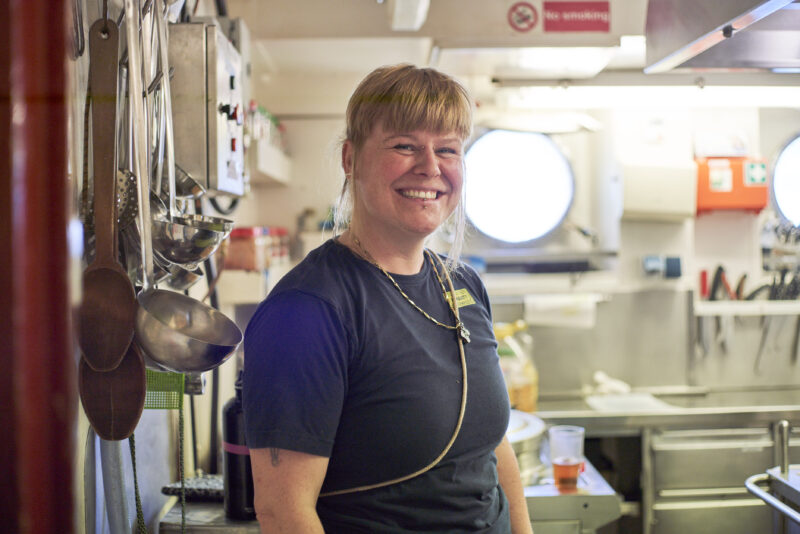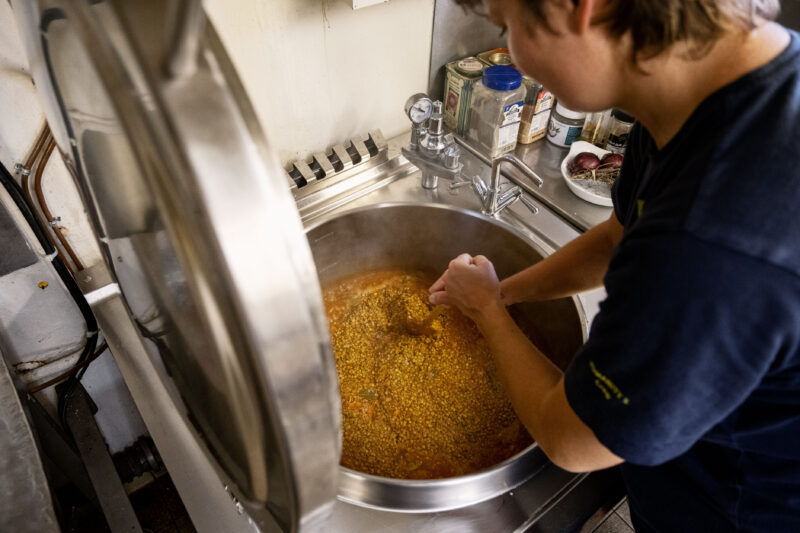Cooking aboard Humanity 1

Tine is a cook on board the Humanity 1 and provides survivors and crew with meals for several weeks during a mission. For this, she prepares exclusively vegan dishes for several hundred people – a challenge in a small ship’s galley. Why Tine is committed to civil search and rescue despite stress and hard work, how she can sweeten the day for people on board and what she thinks of European migration policy, you can read here.
How did you come to work on board a search and rescue ship?
I am actually a landscape ecologist. I ended up at a shipyard by chance at the beginning and then realised how well I could contribute. First, I did a lot of logistics, later I started cooking.
What does your daily work look like?
My job is to provide food for all the people on board – it starts with breakfast. Everyone prepares their own breakfast. I just make sure there are enough spreads, juices, coffee, milk and bread – if we can manage it, home-baked. After the morning meeting at 8 am, the crew cleans up together and I check the temperatures of all the freezers and fridges. I check the left-overs from the previous day and sort out or think about how I can reuse larger quantities.
We usually start cooking at 9 am, because it takes 3 hours to prepare a dish with several components for a crew of 29. Lunch is served at 12 o’clock. There are always 2 crew members who help me as galley supports. They help with the washing up, cleaning the kitchen and clear the buffet after an hour. Depending on the time, my lunch break starts around 1 pm. I prefer to spend it on deck in the sun, because otherwise I don’t get direct sunlight for the whole day.
At 3 pm the whole thing starts all over again and at 6 pm dinner is served. Afterwards, the kitchen has to be cleaned spotlessly to keep everything hygienic. Saturday evening and Sunday are for self-catering and the kitchen can be used by the crew. Of course, this only applies to the time in port.
What else is different about working at sea compared to working in the shipyard?
It’s hard to compare. In the shipyard, you always have the same daily routine, weekends and you can go to the supermarket if something is missing. However, you always have to get involved with new people. Even when cooking, that means explaining a lot how things work and changing demands on food, due to allergies for example. At sea we have a clear plan and a consistent team, but also training, unpredictable situations, lack of sleep, trauma – and always the fate of people whose rights are being trampled on.
What does it mean for you and the people’s food supply when a distant port is assigned and the crossing takes several days?
Of course, we can only carry a limited amount of food at a time. Depending on how many people are on board and how many days are added by an unnecessarily long crossing, some ingredients will eventually run out. This does not mean that there is not enough food. We calculate the most important ingredients for 200 people for 3 weeks. However, the food naturally becomes more monotonous with a longer crossing. Food that doesn’t last that long will eventually run out. Even if we have a small amount of bread in stock, we can only serve it if there is enough for everyone. Everyone, this means our crew and the rescued people, because they all get the same food.
As a cook, you come into contact with the people on board every day. Is there an encounter that has particularly stuck in your memory?
During the last rotation, there was actually a situation that directly affected me in my work as a cook. We had a lot of small children on board. Being on deck I noticed two of them fighting bitterly over a piece of BP bar. These are high-calorie bars that we hand out when the survivors come aboard. They are very filling but really don’t taste that great.
So I thought I could at least give the people who are here with us a little treat and baked some chocolate cake at night, so that everyone could have a big piece the next day when we said goodbye.

Was bedeutet es für dich und die Verpflegung der Menschen, wenn ein weit entfernter Hafen zugewiesen wird und die Überfahrt mehrere Tage in Anspruch nimmt?
Wir können natürlich nur eine begrenzte Menge an Lebensmitteln auf einmal mit uns führen. Je nachdem wie viele Menschen an Bord sind und wie viele Tage hinzukommen durch eine unnötig lange Überfahrt, gehen manche Zutaten dann irgendwann aus. Das heißt nicht, dass es dann zu wenig Essen gibt. Wir kalkulieren die wichtigsten Zutaten für 200 Menschen für 3 Wochen. Allerdings wird die Kost bei einer längeren Überfahrt natürlich eintöniger. Lebensmittel, die sich nicht so lange halten, werden irgendwann knapp. Denn selbst, wenn wir etwa noch eine kleinere Menge Brot auf Vorrat haben, können wir es nur servieren, wenn es auch für alle reicht. Alle heißt unsere Crew und die Geretteten, denn sie alle bekommen das gleiche Essen.
Als Köchin kommst du tagtäglich mit den Menschen an Bord in Kontakt. Gibt es eine Begegnung, die dir besonders in Erinnerung geblieben ist?
Bei der letzten Rotation gab es tatsächlich eine Situation, die mich in meiner Arbeit als Köchin direkt betroffen hat. Wir hatten viele kleine Kinder an Bord und als ich an Deck war, habe ich bemerkt wie sich zwei von ihnen erbittert um ein Stück BP-Bar gestritten haben. Das sind hochkalorische Riegel, die wir am Anfang austeilen, die sehr satt machen, aber wirklich nicht besonders toll schmecken.
Da dachte ich, ich kann zumindest den Leuten, die grade hier bei uns sind, eine kleine Freude machen und habe nachts noch Schokokuchen gebacken, sodass am nächsten Tag zum Abschied alle ein großes Stück bekommen konnten.
What do you wish from politics?
I wish that politicians realise that people flee and migrate because there is no humane alternative for them in their countries of origin. Many factors are responsible for this, such as the ongoing exploitation and oppression of resource-rich countries by large corporations of the Western industrialised nations. Colonial consequences and the continuing profit made from the unstable situation of many countries must be named and recognised as a decisive cause for impossible living conditions of the people on the ground, in addition to the consequences of climate change.
I am disgusted by the isolation at the borders of the EU and how human lives are blatantly measured – especially those of non-white people. People see Europe as a place of hope and expect their human rights to be respected there. But the mendacity with which progress, freedom and justice are praised here is obvious when you see how people in need are treated at Europe’s borders. I would like to see the values that the EU is committed to respected, and not just on paper or if you have the right papers.


